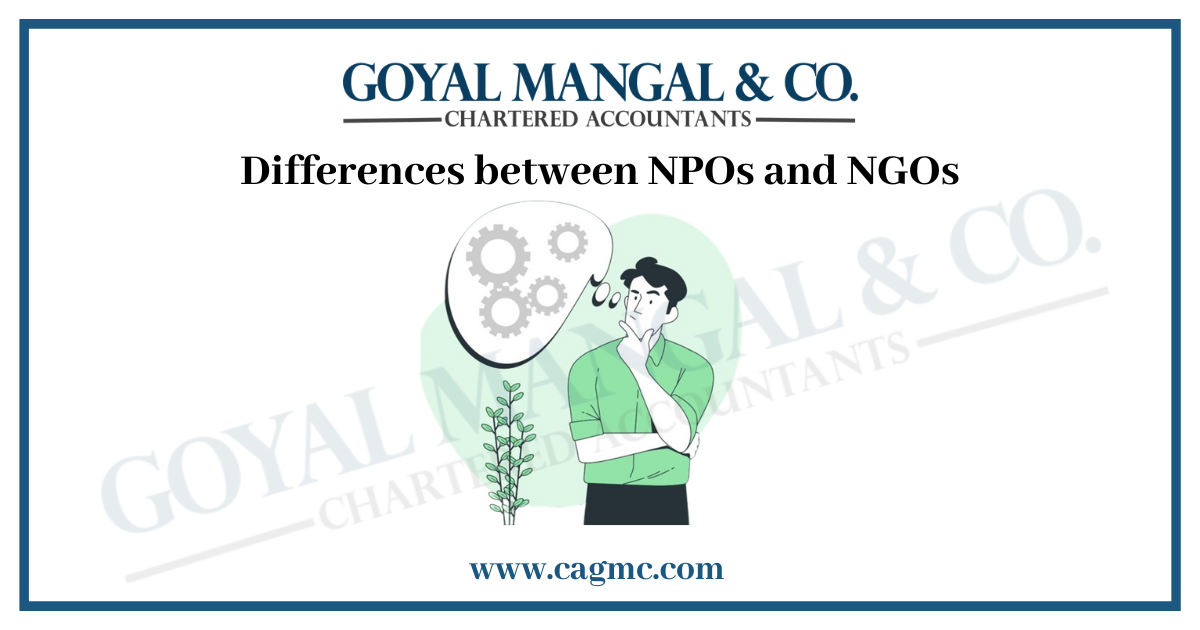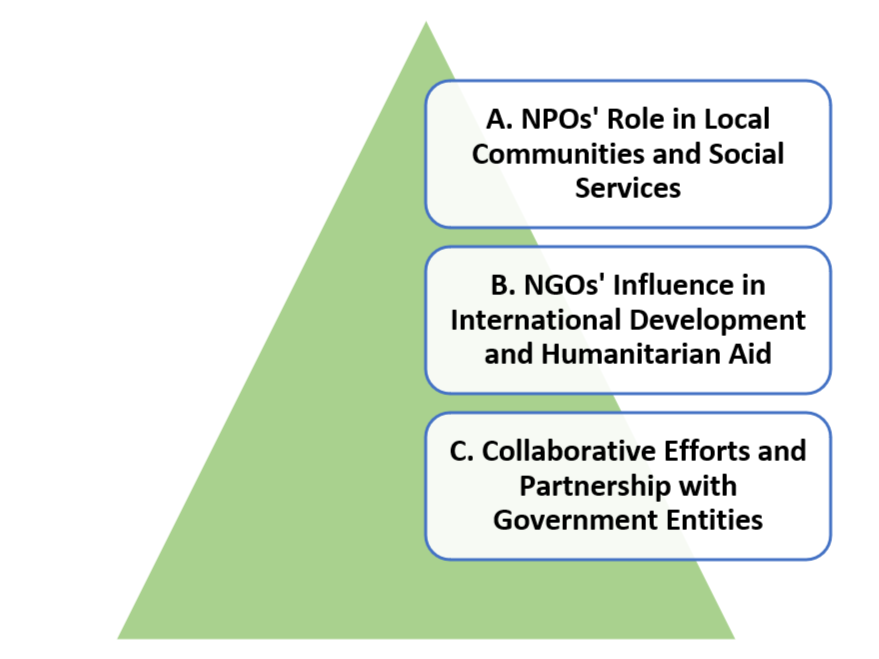
In the world of social welfare and humanitarian work, , a critical aspect to consider is the Comparison Between NPO And NGO. The differences between NPOs and NGOs both are essential players in addressing societal problems and helping communities. However, they have some key differences in how they are organized, where they get their funding, and how they operate. Understanding these differences is important to see how they each contribute uniquely to social development.
|
Table of Content |
NPO Overview
Explanation of Non-Profit Organizations (NPOs)
Non-Profit Organizations (NPOs) are entities established for social, charitable, educational, religious, or humanitarian purposes, rather than to generate profits for owners or shareholders. NPOs aim to address specific societal needs and provide services to benefit communities and individuals.
Mission and Goals of NPOs
- Mission: The mission of NPOs revolves around serving the public interest and working towards the betterment of society. They focus on various causes, such as poverty alleviation, healthcare access, environmental conservation, education, and cultural preservation.
- Goals: NPOs typically set specific, measurable, achievable, relevant, and time-bound (SMART) goals to fulfill their mission effectively. These goals help guide their actions and measure their impact on the targeted communities.
Legal Structure and Registration Requirements
- Legal Structure: NPOs can take different legal forms depending on the country’s regulations, including charitable trusts, societies, associations, foundations, and public benefit corporations.
- Registration Requirements: To operate as a non-profit, NPOs must register with relevant government authorities. This process varies by jurisdiction and involves fulfilling certain legal obligations and documentation.
Funding Sources for NPOs
- Donations: One of the primary sources of funding for NPOs is charitable donations from individuals, corporations, and philanthropic foundations. These donations can be one-time contributions or recurring pledges.
- Grants: NPOs often seek grants from government agencies, international organizations, and private foundations to support specific projects or programs.
- Corporate Partnerships: Collaborating with businesses through corporate social responsibility initiatives can provide NPOs with funding and resources.
Examples of Prominent NPOs
- American Red Cross: Provides disaster relief, blood donation services, and support to vulnerable communities.
- World Wildlife Fund (WWF): Focuses on wildlife conservation and environmental protection worldwide.
NGO Overview
Explanation of Non-Governmental Organizations (NGOs)
Non-Governmental Organizations (NGOs) are private, independent entities that operate without government control or affiliation. They are formed by individuals or groups of individuals to address various social, environmental, and humanitarian issues at local, national, or international levels. NGOs play a crucial role in advocating for social change, promoting human rights, and supporting sustainable development initiatives.
Mission and Objectives of NGOs
- Mission: The mission of NGOs is centered around addressing specific issues and concerns that align with their core values. This mission guides their activities and determines the scope of their work.
- Objectives: NGOs set specific objectives related to their mission. These objectives are measurable goals that outline the desired outcomes of their initiatives, projects, or campaigns.
Legal Status and Types of NGOs
- Legal Status: NGOs can have different legal statuses, depending on the country’s regulations. They might be registered as non-profit organizations, charitable trusts, foundations, or associations.
- Types of NGOs: NGOs can be categorized based on their focus areas, such as environmental NGOs, human rights NGOs, healthcare NGOs, education NGOs, and advocacy NGOs, among others.
Funding Sources for NGOs
- Individual Donations: NGOs often rely on individual contributions from supporters and donors who believe in their cause and want to make a positive impact.
- Corporate Sponsorships: Some NGOs collaborate with businesses through corporate social responsibility programs, receiving funding and support.
- Grants: NGOs apply for grants from various foundations, trusts, and grant-making organizations to finance specific projects.
Examples of Well-Known NGOs
- Oxfam: An international NGO addressing poverty, inequality, and social injustices worldwide.
- Greenpeace: Known for its environmental activism and campaigns promoting ecological sustainability.
Similarities between NPOs and NGOs
- Mission-Driven: Both NPOs and NGOs are mission-driven organizations that operate with the primary goal of serving the public interest and contributing positively to society. Their missions can range from promoting education and healthcare to environmental conservation and poverty alleviation.
- Non-Profit Nature: Both entities are non-profit in nature, meaning that they do not seek to generate profits for shareholders or individuals. Instead, any surplus funds are reinvested into their projects or used to further their mission.
- Focus on Social Issues: NPOs and NGOs share a common focus on addressing various social issues and working towards creating a positive impact on communities and individuals in need. They dedicate their efforts to improving social welfare and promoting human rights.
- Reliance on Donations and Grants: Both NPOs and NGOs often rely on donations, grants, and funding from individuals, corporations, governments, and international agencies to support their operations and initiatives. This funding model enables them to carry out their work effectively.
- Voluntary Participation: Both types of organizations often rely on the support of volunteers who contribute their time, skills, and expertise to further the organization’s mission. Volunteers play a crucial role in the success of NPOs and NGOs.
Key Differences between NPOs and NGOs
- Terminology and Global Scope:
- The term “NPO” is commonly used in specific countries or regions, while “NGO” is a more widely recognized term used internationally to refer to various non-governmental, non-profit entities.
- Services vs. Advocacy:
- NPOs often focus on providing direct services and support to their target beneficiaries, such as offering education, healthcare, or social assistance.
- NGOs may engage in advocacy, lobbying, and policy influencing in addition to service provision, aiming to create systemic change and address root causes of social issues.
- Geographic Presence:
- NPOs may be more localized in their operations, concentrating on specific regions or communities within a country.
- NGOs can have a more widespread presence, working across borders and addressing global challenges that require international cooperation.
- Government Relations:
- NPOs may have more collaborative relationships with governments and work alongside them to deliver specific services or address local needs.
- NGOs often maintain an independent stance from governments and may hold them accountable for their actions or advocate for policy changes independently.
- Structure and Governance:
- NPOs typically have a structured organizational setup, including a board of directors or trustees responsible for overseeing the organization’s activities and decision-making.
- NGOs can have diverse structures, varying from small grassroots groups to large international organizations, and their governance models may vary accordingly.
- Recognition and Affiliation:
- NPOs are recognized as official non-profit entities within the legal framework of their country and may receive tax-exempt status.
- NGOs may seek recognition and consultative status with international bodies such as the United Nations to participate in global dialogues and activities.
- Perception and Public Image:
- NPOs are often associated with charitable work and community service, seen as organizations that directly provide assistance to those in need.
- NGOs are perceived as broader entities working on a range of issues, including advocacy, environmental protection, human rights, and disaster relief, among others.
Impact and Contributions to Society

NPOs’ Role in Local Communities and Social Services
- Community Development: NPOs actively engage in community development initiatives, addressing the specific needs of local populations. They may offer services such as education, healthcare, housing assistance, and employment support to uplift the community.
- Social Welfare: NPOs play a crucial role in providing social welfare services, catering to vulnerable groups like the elderly, disabled individuals, and low-income families. Their programs focus on improving the quality of life and ensuring equal opportunities for all.
- Empowerment and Advocacy: NPOs empower individuals by advocating for their rights and raising awareness of social issues. They encourage civic engagement, promote inclusivity, and drive social change through education and public awareness campaigns.
NGOs’ Influence in International Development and Humanitarian Aid
- Global Health Initiatives: NGOs are at the forefront of global health initiatives, combating infectious diseases, promoting vaccination programs, and improving healthcare access in underserved regions.
- Education and Capacity Building: NGOs focus on empowering communities in developing countries through educational programs and capacity-building projects, equipping locals with skills and knowledge to improve their livelihoods.
- Sustainable Development: NGOs promote sustainable development practices, emphasizing environmental conservation, renewable energy, and climate change mitigation on a global scale.
Collaborative Efforts and Partnership with Government Entities
- Advocacy and Policy Influence: NPOs and NGOs collaborate with government entities to influence policies and advocate for social and environmental causes. They provide valuable insights and data-driven evidence to shape more effective policies.
- Public-Private Partnerships: NGOs often team up with businesses and corporations to address social and environmental issues collaboratively. Such partnerships leverage resources and expertise for greater impact.
- Joint Implementation of Projects: Governments and NGOs work together to implement projects that align with their shared objectives, such as public health initiatives, disaster management, and poverty alleviation programs.
Conclusion
In conclusion, Non-Profit Organizations (NPOs) and Non-Governmental Organizations (NGOs) are pivotal actors in driving positive change and addressing critical societal challenges. NPOs play a vital role in local communities, providing essential social services, empowering individuals, and advocating for social justice. On the other hand, NGOs demonstrate their influence on an international scale, responding swiftly to humanitarian crises, improving healthcare access, and advancing global development initiatives. Collaborative efforts between NPOs, NGOs, and government entities are essential in driving meaningful change. By working together, they can leverage resources, expertise, and influence to tackle complex challenges and create effective policy solutions.


